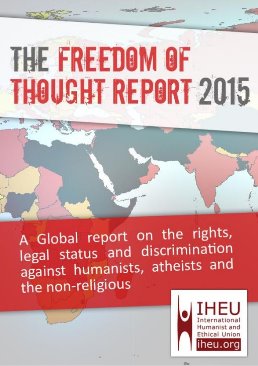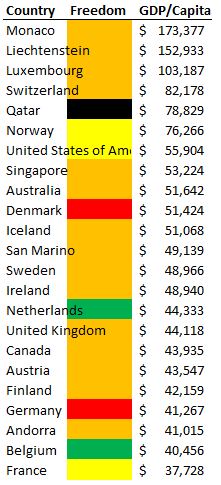The weekly report on secular demographic research
by Jordan Auburn
The Data
 The Freedom of Thought Report 2015, published by the International Humanist and Ethical Union (IHEU), is a detailed analysis of the ÔÇ£rights, legal status and discrimination against humanists, atheists and the non-religiousÔÇØ. Despite those self-identifying as religious dropping 9% between 2005-2012, while self-identifying atheists rose by 3% in the same period, we still live in a world where expressing atheism is effectively punishable by death in thirteen countries. Of the eight countries with the best possible rating (Free and Equal), all are secular. Of the next 18 best rated countries, 16 are officially secular, or show much secularity.
The Freedom of Thought Report 2015, published by the International Humanist and Ethical Union (IHEU), is a detailed analysis of the ÔÇ£rights, legal status and discrimination against humanists, atheists and the non-religiousÔÇØ. Despite those self-identifying as religious dropping 9% between 2005-2012, while self-identifying atheists rose by 3% in the same period, we still live in a world where expressing atheism is effectively punishable by death in thirteen countries. Of the eight countries with the best possible rating (Free and Equal), all are secular. Of the next 18 best rated countries, 16 are officially secular, or show much secularity.
So what are the factors that make a country more or less free with regard to religion? LetÔÇÖs look at some of the other important results in more detail.
China’s “Atheist State”
Despite record (and slowing) rates of economic growth, China, which holds a seat on the UN Security Council, has the worst possible rating: Grave Violations. An officially ÔÇÿatheistÔÇÖ state, the Chinese constitution ensures ÔÇÿfreedom of religious beliefÔÇÖ. However, this is severely restricted. Did you know, for example, that a religious citizen is permitted to only worship one of the five state-sanctioned religions: Protestantism, Catholicism, Islam, Buddhism, Taoism? This is opposed to the basic tenets of a secular society, which uphold the neutrality of the state in matters of religious belief.
Canada: Worse than the US?
Surprisingly, freedom from discrimination is more restricted in Canada (Rating: Systematic Discrimination) than in the USA (Rating: Mostly Satisfactory). In Canada, 50% of provinces provide ÔÇ£partial or full funding to religious schoolsÔÇØ. These schools can discriminate on religion grounds when considering positions for staff or students, with a constitutional footing to boot. By comparison, ÔÇ£no formal discrimination in educationÔÇØ was found to exist in the USA. Though the controversial teaching of pseudo-science and the composition of prayers for school students persists, the Establishment Clause continues to largely prohibit the stateÔÇÖs promotion of religion in state-funded schools, a secular position which very much promotes freedom of expression and investigative methods of thought.
Unexpected Findings 
 So what are the trends? By correlating this report with economic data, I observed that:
So what are the trends? By correlating this report with economic data, I observed that:
- 31 countries had┬áÔÇÿGrave ViolationsÔÇÖ. Interestingly, these were all from Africa and Asia.
- We think of Europe as being progressive, but 12 of the 44 European nations had┬áÔÇÿSevere ViolationsÔÇÖ (27%).
- However, 18% of European countries were┬áÔÇÿMostly SatisfactoryÔÇÖ or ÔÇÿFree and EqualÔÇÖ ratings ÔÇô the best of all the continents.
- Economic prosperity is not seen to guarantee freedom. Of the top ten economies by GDP, 50% returned ÔÇÿSevereÔÇÖ or ÔÇÿGraveÔÇÖ Violations. Just 30% were ÔÇÿMostly SatisfactoryÔÇÖ ÔÇô Japan, USA, and France. Interestingly, these three countries are the only secular states in the top ten list by GDP.
- Of the top five economies by GDP per capita (Monaco, Liechtenstein, Luxembourg, Switzerland, Qatar), none returned ÔÇÿMostly SatisfactoryÔÇÖ ratings. Perhaps┬áall these rich people think they are blessed by God?
Takeaways
What can we conclude from this? Investing in┬ácountries like China and Russia in the hopes that improving their economy may lead to reform may simply not work — at least in the short term. Secular people may find many allies among religions that feel muscled out in governments that have bias. And governments tend to follow regional trends and should be encouraged to look globally for examples of how to define freedom.
What are your policy recommendations? What’s your explanation for the handful of countries in North and South America that still don’t have religious freedom? Post your comments to the SPI Facebook and Twitter.
